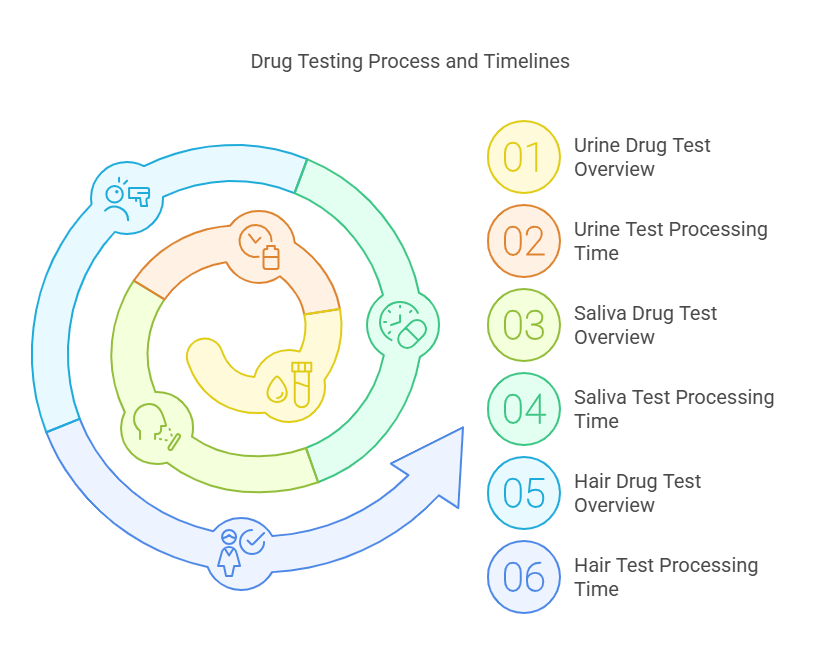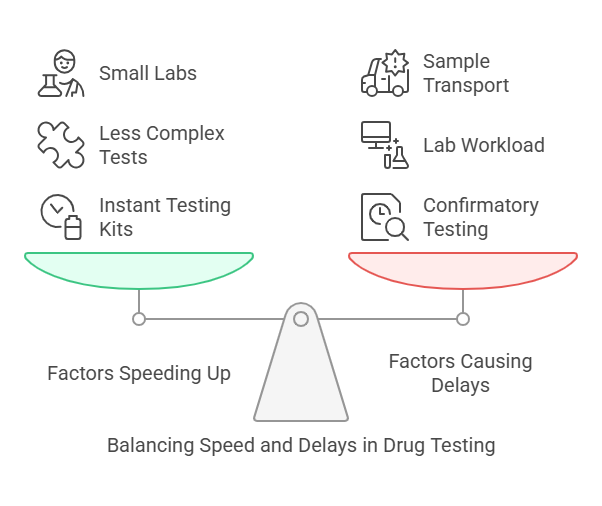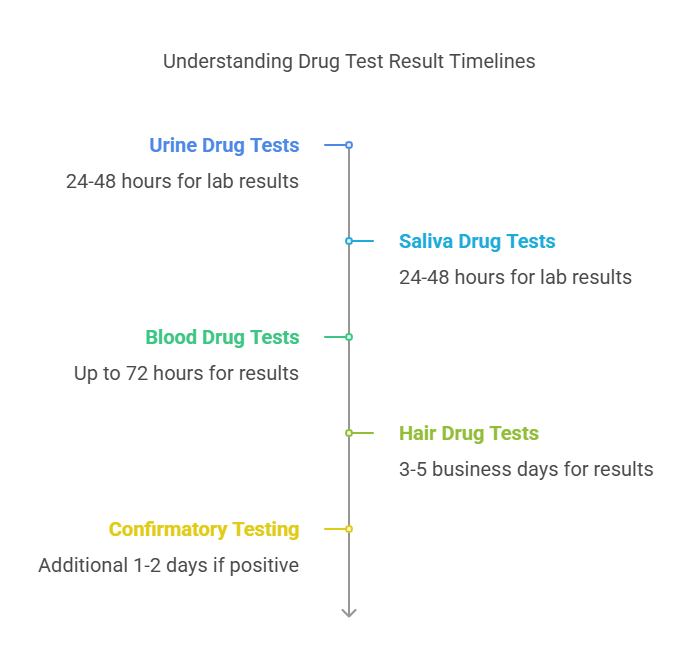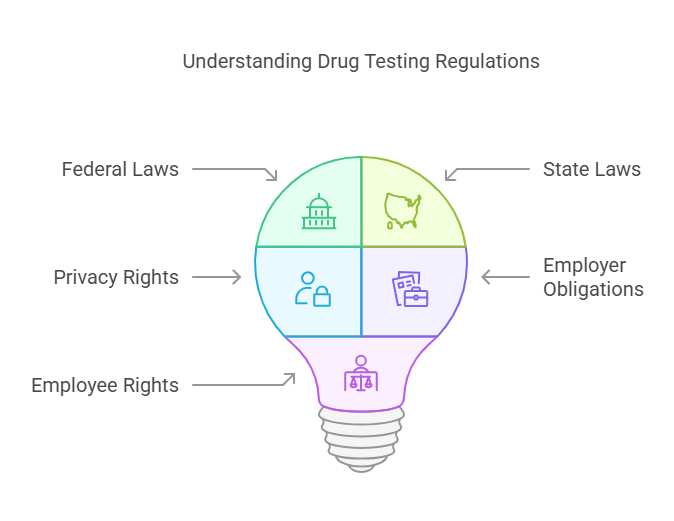Common Drug Tests and Their Result Durations

What is Drug Testing and Why is It Conducted?
Drug tests is the process of analyzing an individual’s biological samples to detect the presence of drugs, alcohol, or other substances. These tests are often used for various purposes, including workplace screening, legal compliance, and health monitoring. The primary aim of drug testing is to ensure a safe, drug-free environment for individuals, especially in critical industries, such as transportation, healthcare, and law enforcement.
Drug tests are typically conducted in several scenarios:
- Pre-Employment Testing: Employers require drug tests to evaluate candidates before offering them employment, ensuring a drug-free workplace.
- Random Drug Testing: Some companies implement random testing as part of their drug-free workplace policies to monitor existing employees and maintain safety.
- Post-Accident Testing: After an accident or workplace injury, drug testing helps determine whether substance use was a contributing factor.
- Reasonable Suspicion: If there is suspicion that an employee is under the influence of drugs or alcohol, they may be asked to take a drug test.
- Return-to-Duty Testing: Individuals who previously violated drug policies may be required to pass a drug test before returning to work.
Drug testing is also commonly conducted in clinical settings, rehabilitation programs, and for legal purposes. The type of test and the substances being tested for can vary depending on the specific requirements of the situation.
Types of Drug Tests and Their Typical Processing Times

There are several types of drug tests, each with varying levels of accuracy, detection windows, and processing times. The most commonly used methods are urine tests, saliva tests, hair tests, and blood tests.
1. Urine Drug Test
- Overview: The urine test is the most common type of drug test due to its ease of use and cost-effectiveness. It is used to detect a wide range of drugs, including marijuana, cocaine, opiates, and amphetamines.
- Processing Time:
- Standard Test: Results are usually available within 24-48 hours. Lab-based tests typically take this time to process, and the results are reviewed for accuracy.
- Instant Test: Some employers use rapid tests that provide immediate results within 5-10 minutes. However, if the results are positive, they may still require confirmation via a lab test, which can take additional time.
2. Saliva Drug Test
- Overview: Saliva tests are gaining popularity for their non-invasive nature and ease of administration. This type of test detects recent drug use, usually within a 1-2 day window, depending on the substance.
- Processing Time:
- Standard Test: Saliva drug tests typically take between 24-48 hours to process at the lab. Like urine tests, on-site results are available in minutes, but positive results may require lab confirmation.
3. Hair Drug Test
- Overview: Hair follicle tests are commonly used to detect long-term drug use, with a detection window that spans 90 days or more. These tests are particularly useful for employers looking to detect a history of drug use.
- Processing Time:
- Standard Test: Results generally take 3-5 business days. The hair sample must be sent to a certified laboratory for analysis, which requires more time for testing.
- Confirmation Testing: If the results are positive, confirmatory testing is required, which can extend the timeline by an additional day or two.
4. Blood Drug Test
- Overview: Blood tests are used in more specialized situations, such as detecting the presence of substances in the bloodstream. These tests are generally used to determine the current impairment of an individual and are often used in legal or medical scenarios.
- Processing Time:
- Standard Test: Blood tests usually take between 24-72 hours to process, depending on the laboratory’s workload and the complexity of the substances being tested.
General Timeline for Drug Test Results
Drug test timelines can vary depending on the test type, lab workload, and other factors. In general, drug tests can provide results anywhere from a few minutes to a few days. However, the type of test being performed will largely determine the processing time:
- Instant Tests: For rapid, on-site testing (such as urine or saliva), results can be available in 5-10 minutes. These results are preliminary and may be subject to further lab analysis if they are positive.
- Standard Lab Tests: Lab-based tests, which are considered more reliable, usually take 24-72 hours for results to be processed and returned.
- Hair and Blood Tests: These tend to take longer, usually between 3-5 business days for hair tests and 24-72 hours for blood tests.
Factors That May Speed Up or Delay Drug Test Results

There are several factors that can influence how quickly you receive your drug test results. Some factors that can speed up the process include:
- Use of Instant Testing Kits: On-site tests provide immediate results and can help expedite the process.
- Less Complex Tests: Tests for fewer substances (e.g., testing for one specific drug rather than a panel of substances) are typically faster to process.
- Small Labs: Smaller, local labs may have quicker turnaround times than larger labs handling higher volumes of tests.
On the other hand, several factors can cause delays:
- Confirmatory Testing: If an initial test is positive, confirmatory testing using more precise methods, such as Gas Chromatography-Mass Spectrometry (GC-MS), may take 1-2 additional days.
- Lab Workload: High demand or backlogs in testing labs can extend the processing time.
- Sample Transport: If the sample must be shipped to a distant lab, transportation delays can add extra time.
Role of Labs and Employers in Processing and Receiving Results
Once the sample is collected, it is typically sent to a certified laboratory for testing. The lab analyzes the sample and determines whether the tested substances are present. After testing is completed, the results are sent back to the requesting party—usually the employer, medical facility, or testing company.
Employers play a role in initiating and overseeing the process but typically do not handle the actual testing. They will receive the results from the lab and are responsible for interpreting the outcome, especially when it comes to positive results or the need for further testing.
Employers or testing companies usually inform candidates of the results, and if the results are positive, the individual may be asked to undergo additional confirmatory testing or explanation.
Key Factors that Impact How Long Drug Test Results Take

The timeline for receiving drug test results can be affected by various factors. Some factors are within your control, such as submitting accurate personal information, while others are outside of your control, such as the testing laboratory’s workload. Below, we’ll explore the most significant factors that influence drug test result timelines.
1. Type of Drug Test Performed
The type of drug test being conducted is one of the most important factors in determining how long it will take to get results. Some tests are more straightforward and can be processed quickly, while others require more detailed analysis and may take several days.
- Urine Drug Tests: These are among the fastest tests to process. While rapid tests can provide results in minutes, lab-based tests generally take 24-48 hours to return results. However, if confirmatory testing is needed, this could add an extra day or two to the timeline.
- Saliva Drug Tests: These tests can produce results quickly, typically within 24-48 hours when sent to a lab. Instant saliva tests provide results within minutes, but these are usually preliminary and may require further analysis for positive results.
- Hair Drug Tests: Hair tests have the longest processing times, typically taking 3-5 business days. These tests require more detailed analysis to detect long-term drug use, which contributes to the longer processing times.
- Blood Drug Tests: Blood tests are often more complex and may require up to 72 hours for results. They are typically used to detect current impairment or substance use rather than long-term use and are commonly used in medical or legal situations.
2. Lab Workload or Delays
The lab’s workload and efficiency are critical in determining how long it will take to get your results back. If a lab is handling a high volume of tests, it may take longer for your sample to be processed. Some factors that affect lab delays include:
- High Testing Volume: Labs that process a large number of samples daily may experience longer processing times due to backlogs. This is especially true for labs in busy industries or during certain times of the year when testing demand increases (e.g., pre-holiday season or following a major event).
- Urgency of Test Results: Some drug tests are marked as “urgent” or “priority,” which can speed up processing times. If an employer or medical facility requests a quick turnaround, this may help expedite the testing process.
- Lab Efficiency: Different laboratories have varying levels of operational efficiency. Some labs may process results faster, while others may take longer due to outdated equipment or personnel shortages.
3. Confirmatory Testing for Positive Results
In cases where the initial drug test returns a positive result, confirmatory testing may be required. This additional testing is more accurate and reliable, and it often takes longer to process.
- Confirmatory Tests: Confirmatory tests, such as Gas Chromatography-Mass Spectrometry (GC-MS) or High-Performance Liquid Chromatography (HPLC), are used to verify the presence of drugs in the system. These tests are much more precise than initial screening methods, but they can take an additional 1-2 days, depending on the complexity of the substances being tested.
- False Positives: If a drug test results in a false positive, additional testing will be required to rule out certain substances. This process takes longer as the lab works to identify the source of the false positive.
4. Inconclusive or Irregular Results
Sometimes, drug test results may come back inconclusive or flagged for irregularities. This can lead to delays in the final results as further analysis or clarification is needed.
- Irregular Samples: Issues such as insufficient sample size, contamination, or damaged samples can result in delayed processing. The lab may need to request a new sample from the individual, further extending the timeline.
- Diluted or Invalid Results: If the sample is diluted (due to excessive water consumption before the test) or invalid (due to tampering), the lab may need to perform additional analysis or retesting. This can delay the overall result by a few days.
5. Sample Transportation and Shipping
Transportation time can significantly impact how long it takes to get drug test results. When samples are not processed on-site and need to be shipped to a laboratory for analysis, this can add time to the testing process.
- Geographic Distance: If the testing sample is being shipped across long distances, it can take several days for the sample to reach the lab. If a lab is located in a remote area, this could add 1-2 days or more to the timeline.
- Shipping Delays: Weather conditions, holidays, or postal service delays can contribute to slower sample transportation. The longer it takes for the sample to arrive at the lab, the longer it will take to receive the final test results.
Instant Drug Tests vs. Lab-Based Tests: A Comparison
There is a significant difference between instant drug tests (such as rapid urine tests) and lab-based tests in terms of the speed of results and reliability. Let’s take a closer look:
| Drug Test Type | Detection Window | Processing Time | Reliability |
|---|---|---|---|
| Instant (Rapid) Urine Test | Hours to 1-3 days | 5-10 minutes for results (preliminary) | Can be less accurate; may require confirmation if positive |
| Lab-Based Urine Test | 1-3 days | 24-48 hours | Highly accurate; confirmation required for positive results |
| Saliva Test | Hours to 1-2 days | 24-48 hours | Highly accurate if confirmed in the lab |
| Hair Follicle Test | 90 days (3 months) | 3-5 business days | Accurate, detecting long-term use |
| Blood Test | Hours to 1-2 days | 24-72 hours | Highly accurate; used for current impairment |
- Instant (Rapid) Tests: These are the quickest methods for testing, delivering results in as little as 5-10 minutes. However, they are less reliable, and if the results are positive, a confirmation test is required, adding additional time.
- Lab-Based Tests: These tests, including urine, saliva, and blood tests, take longer but are far more reliable. They require careful analysis, confirmatory testing, and quality control checks, all of which contribute to the longer processing time.
Role of Employers and Testing Providers
Employers or testing providers play a role in influencing the drug test timeline. Here’s how:
- Employers’ Role: Employers may choose between on-site testing (rapid tests) or lab-based tests depending on the needs of their business. Employers should clearly communicate their expectations regarding test results and any deadlines for reporting results.
- Testing Providers’ Role: Testing companies and laboratories are responsible for processing and delivering accurate drug test results. They ensure that proper procedures are followed, and that confidentiality and legal standards are adhered to. These providers often offer expedited services, such as urgent or priority testing, for an additional fee.




